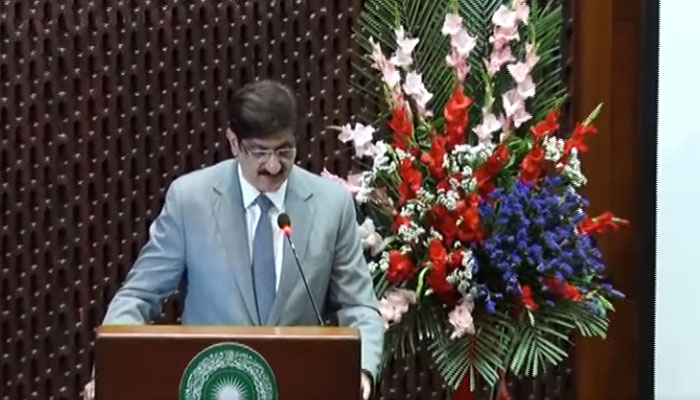Federal, provincial health ministers vow to bolster primary health care
In a strong show of unity, senior federal and provincial leaders on Monday reaffirmed their commitment to revamping primary health care (PHC) as the foundation for universal health coverage (UHC) in Pakistan, stressing that equitable, people-centered systems must begin at the grassroots.
They called for home-grown investment and systemic reforms to strengthen Pakistan’s primary healthcare (PHC) system, stressing the need to double healthcare spending to at least 2 percent of GDP and significantly reduce dependence on international donors.
Speaking at the National Symposium on Primary Health Care: Foundation for Universal Health Coverage in Pakistan, hosted by the Aga Khan University, Sindh Chief Minister Syed Murad Ali Shah, Federal Minister of State for Health Dr Malik Mukhtar Ahmad Bharath, and other top officials pledged to realign policies and financing to expand essential services and improve outcomes for underserved communities.
“Our government is committed to making primary care the backbone of Sindh’s health system,” said Shah. “The pandemic exposed system gaps but also gave us momentum to build something more resilient—starting with strong, community-rooted care.”
He highlighted strategic investments in preventive care, NCD control, community delivery models, and the revival of the Lady Health Worker (LHW) programme. He also praised partnerships like the Peoples Primary Health Initiative and hospital outsourcing as effective urban models. “Sindh has increased its health budget post-devolution, with a focus on primary care,” he said. “But progress needs a whole-of-government and whole-of-society approach—health must be in every policy, from climate to transport.”
Federal Health Minister Dr Malik Mukhtar Ahmad Bharath echoed this, calling PHC reform a national imperative. “This forum lets us harmonize national and provincial strategies for people-centered systems,” he said. “We are building on decades of commitment, from Alma Ata in 1978 to Astana in 2018.”
Bharath cited the rollout of the Essential Package of Health Services (EPHS) at the district level, targeting both communicable and non-communicable diseases through integrated services. He announced major investments: Rs67.77 billion for Hepatitis C elimination and an $18 million pandemic preparedness package.
“We are digitizing healthcare with a proposed Rs33 billion plan to establish telemedicine centres nationwide,” he added. “Our goal is to raise public health spending from 1% to 3% of GDP.”
Dr Bharath emphasized addressing the human resource gap. “We must expand nurse and paramedic training, and strengthen regulation to ensure quality across sectors.”
The two-day symposium was part of the PHC Learning Agenda—a multi-stakeholder initiative by AKU, supported by the Gates Foundation, UNICEF, and the World Bank, to promote policy innovation and provincial learning.
Dr Malik Mukhtar Ahmad Bharath warned that Pakistan will lose GAVI support for vaccine procurement after 2031. He stressed the urgent need to ramp up local vaccine production and health financing to maintain immunization coverage.
“Policymakers used to focus on tertiary hospitals for optics, but now we are shifting attention to the real foundation of health – primary healthcare,” he remarked. Dr Bharath highlighted investments in Electronic Medical Records (EMRs), vaccine manufacturing, and digital healthcare, adding that these initiatives must be owned and sustained locally. He said the federal and provincial governments need to raise health spending from 1 percent to 3—or at least 2—percent of GDP, with plans to scale up telemedicine, regulate the quality of care, and expand the Lady Health Worker programme.
“The future of Pakistan’s health system lies in strong primary healthcare,” concluded Dr Bharath. “Now is the time to invest in it ourselves—our children, communities, and economy depend on it.”
The event, part of the PHC Learning Agenda initiative led by AKU and supported by the Bill & Melinda Gates Foundation, brought together top provincial leadership, development partners, and academic experts to develop a roadmap for achieving Universal Health Coverage (UHC) through stronger PHC systems.
Prof Dr Sameen Siddiqi, professor at the AKU’s Department of Community Health Sciences and symposium’s Principal Investigator, said that despite Alma Ata and Astana Declarations, Pakistan still faces challenges like fragmented services and inequitable access. “We need political will and investment in PHC,” he stressed.
He also praised the late Prince Karim Aga Khan IV for championing community health and said his vision continues through the AKU’s work. “Our department leads in PHC research and innovation, and through the PHC Learning Agenda, we aim to drive real reforms,” he added.
“Primary health care is not just part of the system—it is the system,” said Dr Sulaiman Shahabuddin, president of the AKU. “It helps us reach the last mile, ensure equity, and achieve UHC. Through the PHC Learning Agenda, we’re generating the evidence to turn policy into action.”
He noted that tackling challenges like population growth, mental health, and NCDs requires a renewed focus on quality PHC. “A people-centered approach means listening to communities, investing in frontline workers, and financing care sustainably.”
The symposium had wide representation from all provinces, including Dr Azra Pechuho (Sindh), Bakht Muhammad Kakar (Balochistan), and Ihtisham Ali (KP).
In a video message, Federal Minister Syed Mustafa Kamal highlighted the PHC’s role in meeting SDG health targets. “This symposium is a collective step forward—toward a future where no one is left behind.”
The five priority areas for reform included: integrating population and health services, addressing NCDs and mental health, scaling public-private partnerships, improving quality of care, and reducing donor dependence through sustainable domestic financing.
Sindh Health Minister Dr Azra Fazal Pechuho outlined her province’s efforts to extend LHW services, integrate population welfare and health departments, and connect rural patients to female doctors via telemedicine. “We have tried to strengthen PHC by partnering with NGOs like PPHI, increasing the role of community health workers, and investing in allied health sciences,” she said.
Dr Azra also highlighted the critical role of nurses and paramedics, saying, “The backbone of healthcare is our nursing and allied workforce—we must invest in them alongside doctors.” She emphasized the importance of public-private data sharing and collaboration to address non-communicable diseases (NCDs) and build human resource capacity in healthcare.
Balochistan’s Health Minister, Bakht Muhammad Kakar, shared that the province’s health budget had grown from just Rs8 billion to an expected Rs100 billion in the coming fiscal year. “We now have four medical colleges and over a dozen teaching institutes in a province that once had none,” he said. “But our vast geography demands that we focus on primary care first—this is how we can improve maternal and neonatal health outcomes.”
Representing Khyber Pakhtunkhwa, Ihtesham Ali highlighted a shift in policy from infrastructure development to enhancing the capacity of the existing health workforce. “We hold monthly meetings with district health officers and medical superintendents, assign performance targets, and work on improving service delivery,” he said.
He also noted the benefits of reduced political interference and better coordination with the federal government in improving health indicators in the province.
The symposium spotlighted five strategic priorities to transform PHC in Pakistan: integrating health and population services to address rapid population growth, reconfiguring PHC to address NCDs and mental health, forging public-private partnerships, improving service delivery quality, and increasing domestic health financing while cutting back on external aid dependence. As the symposium concluded, participants vowed to turn shared insights into action and make PHC central to health reform in Pakistan.
-
 US Opens Civil Rights Probe Into Alex Pretti Shooting: Report
US Opens Civil Rights Probe Into Alex Pretti Shooting: Report -
 Prince William, Kate Middleton Decide Next Step For Prince George
Prince William, Kate Middleton Decide Next Step For Prince George -
 Catherine O’Hara: Home Alone Actress Dies After 'brief Illness'
Catherine O’Hara: Home Alone Actress Dies After 'brief Illness' -
 Princess Anne Refuses An Offer Made At Palace
Princess Anne Refuses An Offer Made At Palace -
 'The Rookie's' Mekia Cox Reveals Her Daughter's Debut In Season 8
'The Rookie's' Mekia Cox Reveals Her Daughter's Debut In Season 8 -
 King Charles Faces Challenge Over 'disgraced' Andrew's New Home
King Charles Faces Challenge Over 'disgraced' Andrew's New Home -
 Bianca Censori 'tried' To Walk Away 'a Number Of Times' From Kanye West Marriage: Source
Bianca Censori 'tried' To Walk Away 'a Number Of Times' From Kanye West Marriage: Source -
 Halle Berry Reveals Why She Stayed 'alone' Before Meeting Boyfriend Van Hunt
Halle Berry Reveals Why She Stayed 'alone' Before Meeting Boyfriend Van Hunt -
 'A Knight Of The Seven Kingdoms' Peter Claffey Makes Rare Comment About Costar Dexter Sol Ansell
'A Knight Of The Seven Kingdoms' Peter Claffey Makes Rare Comment About Costar Dexter Sol Ansell -
 Sarah Ferguson's Friend Opens Up About Former Duchess Of York Mental Health
Sarah Ferguson's Friend Opens Up About Former Duchess Of York Mental Health -
 Claudia Oshry Shares Key Reason Behind Her Exit From 'The Masked Singer' Season 14
Claudia Oshry Shares Key Reason Behind Her Exit From 'The Masked Singer' Season 14 -
 Jelly Roll, Wife Bunnie Xo Suffer From 'baby Fever'
Jelly Roll, Wife Bunnie Xo Suffer From 'baby Fever' -
 Princess Beatrice's Husband Visits Erotic Painting In US
Princess Beatrice's Husband Visits Erotic Painting In US -
 Prince William To Turn To Zara Tindall For Support In Royal Duties
Prince William To Turn To Zara Tindall For Support In Royal Duties -
 Gabrielle Union Recalls Her First Meeting With Barack Obama
Gabrielle Union Recalls Her First Meeting With Barack Obama -
 Why Trump Nominated 'Kevin Warsh' For Fed-chair: Know All Details
Why Trump Nominated 'Kevin Warsh' For Fed-chair: Know All Details




